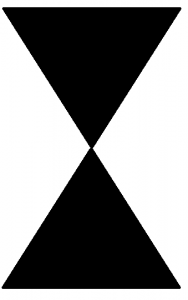“That which comes together must break apart- that which breaks apart must come together.” – Old Chinese Proverb
Today, I was talking to one of my co-workers about the future of the music industry and he was discussing how 100 years ago a musician needed to be a part of a large group to produce music. Yes, in theory one man with an instrument could produce music, but the mass-media form of music at the time was an orchestra that people physically went to see. That required not just musicians, but composers, backers, conductors, producers and even marketers- in other words, a lot of people.
Now, on hundred years later, a single person with a smartphone app can perform almost all of those functions by themselves, and distribution through the internet is also equally easy. He likened it to an inverted pyramid, where everything slowly came together over time and the power became concentrated into a single person with a single device. But then, our conversation led to the logical question- what’s next?
My answer- the pyramid will start to widen again and power of artists will return to the group over the individual.
I know a lot of people, especially in the ebook publishing world (to shift to book publishing), might strongly disagree with this statement, especially since we’re just being set free! We’re just throwing off the shackles of the traditional publishing industry, and every day there’s a new story about an individual self published author making a living or making it big from ebooks.
But therein lies the problem. Where people smell money and opportunity, that’s where they will go, and they will go in droves. As I talked about in my previous post, the rise of ebook readers doesn’t just mean the opening of a new market- it means the opening of the field for even more competition. And while, as with anything artistic, the cream will rise to the top, the competition at all levels of the industry is about to become fierce.
The “demise” of traditional publishers doesn’t mean just opportunity for authors, it also means the loss of at least three functions they played- gatekeeper, marketer, and editor. All three of these functions are incredibly important for artists and consumers, and they have now been foisted onto the artists themselves.
So, what we will have is a situation where anyone can publish anything, but due to competition and noise it will become harder and harder to find and hold an audience. In addition, with stronger competition, the quality of work must be high or it will be dismissed out of hand by many readers. With books, high quality means good editors, good covers, and potentially more and more up-front costs before any money is made.
On the plus side, this will help sift some of the wheat from the chaff. On the down side, this will also create a barrier to entry for many writers or other artists who simply cannot afford what it takes to have that professional style. Few people are good at everything, and many simply cannot do it alone.
So, why do I say artists need to come together?
Because it’s the only way to overcome the above barriers, and because more and more artists of any kind will need to work as part of a team, or rather a co-operative, to get their work out there. Yes, there will be lone wolves who manage to do it all on their own, but they will become less and less common in time as co-operatives take over the roles of gatekeepers, editors, and even producers and designers. It will become about sharing labour to succeed, and forming groups for the purpose of mutual opportunity for all members. (Not success, since not all members could ever be equally successful, but all can have equal benefits from group memberships.)
This is already happening. Just as “clans” formed in online games, groups of musicians in different genres of music have already started to form together, different graphic artists have started to form “clubs” or “leagues” on places like DeviantArt and writers groups (which have always existed) are starting to support each other in different ways than before. Whether these are informal networks, semi-formal communities, or formal co-operatives, these groups have and will continue to take on the roles that traditional publishers have held in the past.
They must, because as the competition ramps up in the coming months and years, it will be the only way to survive.
